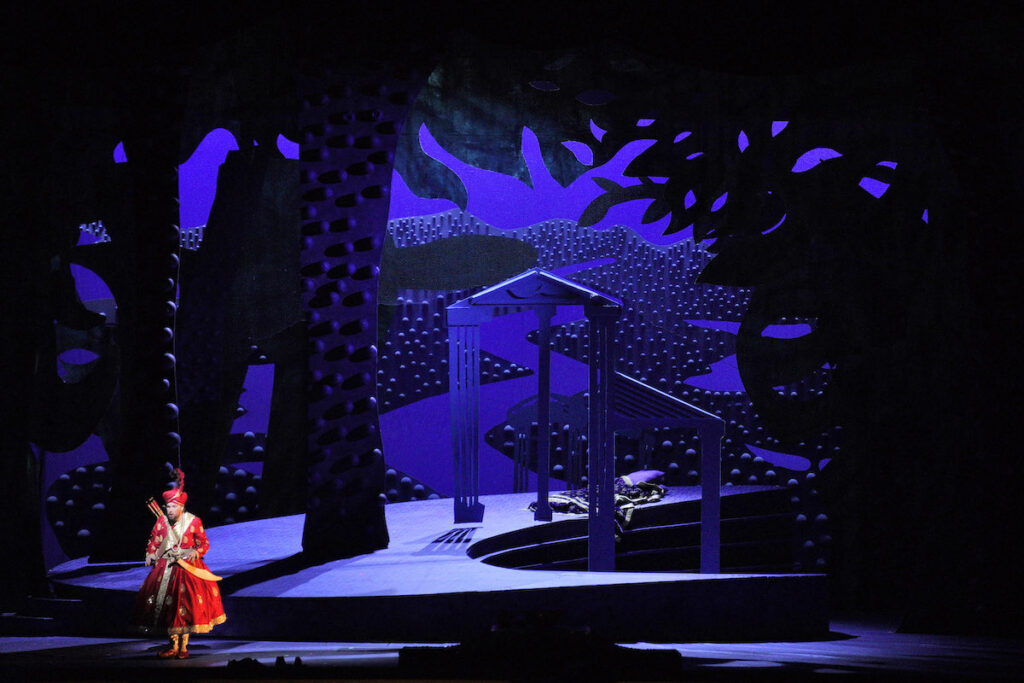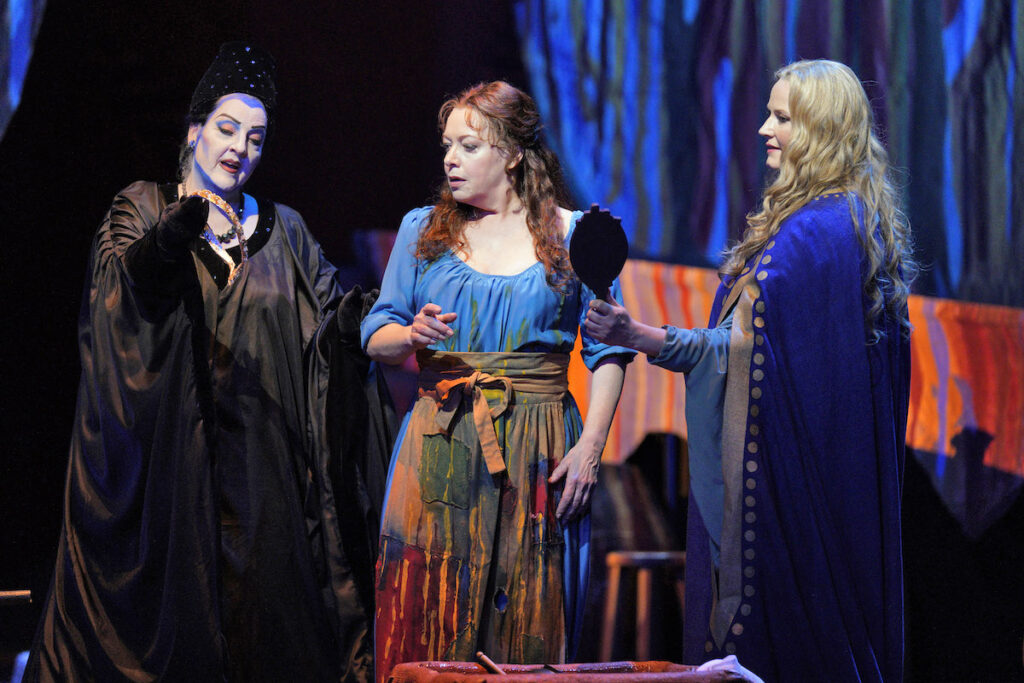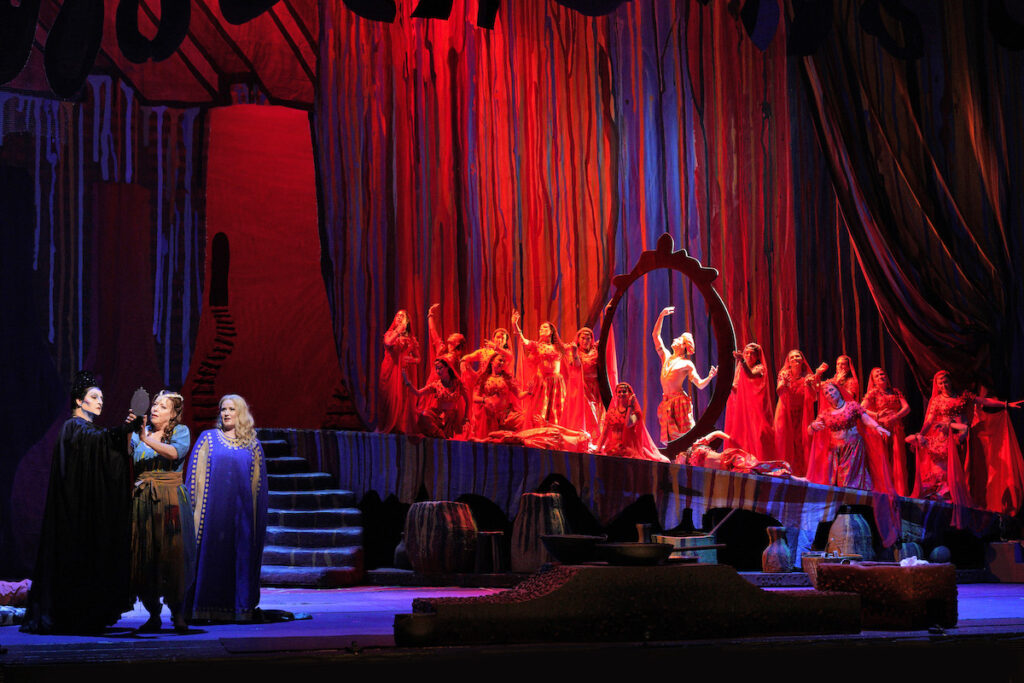One could argue that any production of composer Richard Strauss and librettist Hugo von Hofmannstahl’s Die Frau ohne Schatten (aka The Woman without a Shadow, through June 28 at the War Memorial Opera House, SF) was bound to come with headaches. Since its 1919 premiere, the piece has been infamous for arias that put a strain on even the most seasoned vocalists, and its production demands often push tech crews to their limits.
Then there are the problems inherent to any work that remains in the public consciousness long past its creation. Die Frau ohne Schatten is a story of such rigid and outmoded societal mores—most notably, the cliché of the wife eager to prostrate herself before her husband because her greatest honor would be to bear his child—that its plot synopsis could double as a CHICK tract.

Said plot is less about its title character, the demi-god wife (Finnish soprano Camilla Nylund) of the Emperor (British tenor David Butt Philip), so much as her observing the actions around her. When the Emperor goes hunting after the red falcon that brought he and his wife together, the Empress—who, as the title suggests, suffers from the same condition as that boy from Neverland—follows the advice of her conniving Nurse (SF-born soprano Linda Watson) to take the shadow of a mortal.
The mortal they pick is the wife (Swedish soprano Nina Stemme) of Barak (Danish baritone Johan Reuter), a fabric-dyer and merchant. After three years of marriage, the wife, who was sold to Barak, has become dissatisfied living with her husband and his three lay-about brothers. All attempts to sire a child have failed and the wife has given up trying. When she’s visited by the Empress and the Nurse, the latter presents a Faustian bargain: give the duo her shadow in exchange for “eternal power over men.” Because what better relief is there from a husband who won’t touch you than to command any man in the world?

Needless to say, the outdated gender roles are bright enough to see from space. What’s more, when the wife (and no, I’m not being coy: Barak is the only character given a proper name) truly contemplates not having to bear children, she’s literally haunted by a choir of unborn babies lamenting that they’ll never escape their ethereal form through birth. Add in the elements of obedient wives straying from their husband-providers due to the machinations of a wicked ol’ spinster (the Nurse) and the human eyes can’t roll back enough to ponder the whole thing.
What place does a story like this have in the modern era played at face value?
Perhaps as a purely technical exercise, since there’s certainly no lack of style on the part of the show’s collaborators. British production designer David Hockney gives the Memorial Opera House’s rotating stage a couple of surreal looks that almost suggest a Jack Kirby-esque psychedelia, with a slanted ramp for the Emperor’s palace, an apparent cave for Barak’s home, and everything with just enough color to be noticeable. Ian Falconer’s costumers are equally detailed with care, but one may raise a few eyebrows at the mostly white cast walking around in turbans and other Middle Eastern accoutrements.

As directed by Roy Rallo, the cast managed few vocal stumbles with the infamously challenging libretto, and worked with their characters well. That is to say, they do the most with the thinly drawn caricatures they’ve been given. Nylund seems to have the most trouble, playing a title character who often has very little to do other than waft around the stage like a fallen leaf in the wind. Even when she does (briefly) gain more prominence near the end, the struggle between projecting the character and projecting her voice often becomes apparent. Best served are Stemme, whose performance demands empathy for the nameless wife, and Watson, who becomes the unofficial star of the show by making the one-dimensional Nurse captivating every moment she’s on stage.
As this was one of the SF Opera’s streams (though this one wasn’t live), I wasn’t on-hand to take CO² readings. I will say that I did notice a very small handful of patrons masked during the shots panning over the audience. The Opera House has a top-notch HVAC system, so I hope it’s keeping the patrons as safe as possible.

It’s easy to think Die Frau ohne Schatten was chosen less for its story so much as for the technical challenge it presents. Not every SF Opera element succeeds with the notoriously complex production, but it’s a spectacle to watch them try over the course of three-plus hours. Still, the story is one that’s (hopefully) becoming a bygone relic as we move toward an oeuvre better defined by diversity, character complexity, and the idea that having a baby won’t solve a rotten marriage.
DIE FRAU OHNE SCHATTEN runs through June 28th at the War Memorial Opera House, SF. Tickets and further info here.





